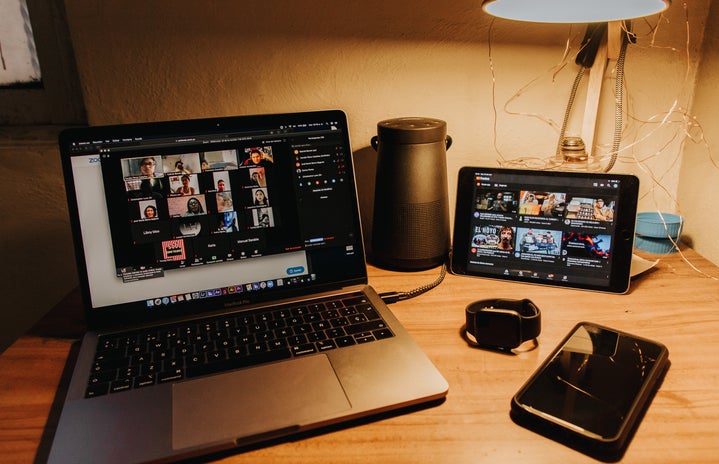Yom Kippur, 2012. I am cunningly sneaking out of the family service of my synagogue to gossip in the bathroom with my friends. We’re ten years old, as restless as we are youthful, betting on how long our fasts will last before we get too hungry, fantasizing about a dinner of the best bagels in NYC, and sparkling cider. By evening, New York will be aglow and I’ll look out my window and see other families circled around their tables with their own little jokes and customs. There is something about that first bite at sundown that is just magnificent, that relieves all the cousinly grumpiness of the day, that reminds me why we keep coming back to these ancient traditions.

These are the kinds of things I run through my head as I sit on a Rosh Hashanah Zoom call and my mom tries to figure out how to unmute herself. She is not successful. The High Holiday season, like my graduation, prom, and all other events I had been animatedly planning in my head, has been forced to reinvent itself through Zoom calls, outdoor gatherings, and painfully deadpan jokes about how shitty this year has been. I’ve been wondering, lately, if it’s even worth it to put on the smile, to get myself dressed up, to pretend like I feel the meaning behind it all in a way I used to.
I have spent far too much of this year replaying the ways in which things feel wrong. I could list all the ways I feel disconnected, dissatisfied, and chronically hopeless. And this didn’t start with the High Holidays. I’ve been trying to think of ways to pull myself out of this ceaseless pessimism, and I don’t think it’ll be useful to spout some hollowly optimistic statement about these unprecedented times. I will, however, offer you this—and I promise you this isn’t an article about the strength of the Jewish religion (that’s for another day) but how no, things will not be bad forever.
Judaism, as a religion, a culture, an ethnicity, has undergone centuries of persecution, hatred, and violence. And yet, thousands of years later, there are people like me who still feel the history like it’s living. Through rain and snow and war and love, Jewish people have huddled wherever they could to preserve the smallest things—whether it be the freedom to light a candle or murmur a prayer.
However, the point of this article isn’t to simply articulate the strength of a religion, but rather the strength of us, as a people, in pushing forward because there is something to love for.
We are living in a time where all hope seems to be crumbling. Young people, including me, are increasingly cynical about the systems we’re told protect us. The illusion of comfort, democracy, and equity has been lifted. There is anger, resentment, sickness, all pouring out into the streets, and it’s hard to pretend like we can ever go back to normal.
But the point of tradition is not to go back to some reactionary idea of normal. The point of tradition is not to repeat things in the exact same manner as before. The point of tradition is not to cling onto values that no longer apply to our ever-evolving culture, nor to shame questioning the things we’ve been taught to recite blindly, nor to run from the unknown simply because it’s scary. Because let’s be real, things are changing, and they’re changing fast. The generation that I’m a part of is as fiery as ever, climate change is spiraling to the point of no return, and I’m eating meals in the dining hall behind a sheet of plexiglass. It’s no use fighting for normality. There’s simply no such thing. Traditions, rather, remind us that the things that are most important, like love, or family, or kindness, can persevere through the most apocalyptic and ridiculous of changes. Traditions remind us that there is something worth fighting for.
Decades ago, my great grandparents must have been breaking fast in Lodz, Poland, amid an atmosphere of formidable antisemitism and fascism. My grandparents celebrated in Brooklyn, New York, early immigrants, and strangers in a city I would soon call home. And I’m celebrating in a pool of fluorescent light in my dorm room in rural Ohio, beside an unnecessarily massive stock of masks and a collection of COVID-19 memes.

I know it’s easier to say all this than it is to really feel it. I, like most of you, have a fantasy of a miraculous vaccine that comes out next week in the periphery of my mind. It could be months before things feel normal. Maybe even years. But I’m proven by history, by my peers, by the spearheaders of all the budding revolutions of my generation, that as we march into a hazy and burning future, all we can do is cling onto the pieces of hope and empathy that we still have.
I can’t say I have any idea of what’s ahead. There’s no such thing as normal, no nostalgic haze to run back to. I can’t offer certainty, or even ancient wisdom. All that’s left is what we make of the things that lie ahead–the scary, the joyful, the comically tragic. What I do know is that we’ve persevered before, and we can do it again. And knowing this, I think we will all be okay.



